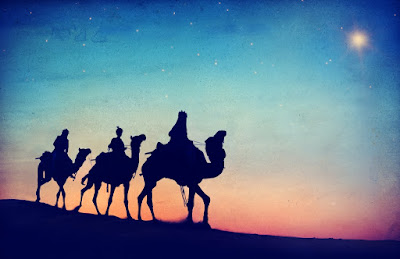Three Kings, Handl, Fricker, Howells, Palestrina, Sheppard, Lassus, Warlock, Cornelius, Anerio; The Sixteen, Harry Christophers; Cadogan Hall
Reviewed by Robert Hugill on Dec 20 2016
Star rating:
An intriguing mix of music in the Sixteen's Christmas concert
Harry Christophers and The Sixteen were at the Cadogan Hall on 20 December 2016 for the first of two Christmas concerts. Their programme, The Three Kings featured an interesting mix of plainchant, Renaissance polyphony, 20th century classics, folk-inspired items and a couple of traditional carols, all themed on the Three Kings.
Reviewed by Robert Hugill on Dec 20 2016
Star rating:
An intriguing mix of music in the Sixteen's Christmas concert
Harry Christophers and The Sixteen were at the Cadogan Hall on 20 December 2016 for the first of two Christmas concerts. Their programme, The Three Kings featured an interesting mix of plainchant, Renaissance polyphony, 20th century classics, folk-inspired items and a couple of traditional carols, all themed on the Three Kings.
We opened with I wonder as I wander, first published by John Jacob Niles in 1934 and of uncertain origins but lovely all the same. The Sixteen's simple but effective presentation was to have a fine solo from Alexandra Kidgell framing verses sung by all the sopranos. Jacobus Handl's Omnes de Saba (the gradual for the Mass of the Epiphany) was vigorous and resonant, and it was lovely to hear John Henry Hopkins' well known We Three Kings sung properly for once, with solos from Tim Jones, Ben Davies and Eamonn Dougan.
Peter Racine Fricker's A Babe is born dates from 1962 but had some nice neo-medievalism in the harmonies with added modern spice, and pleasant metrical irregularity. The traditional This endris night (sung in a four-part arrangement) had a beautiful part-song quality to it, whilst Herbert Howells' Long, long ago (written in 1950) had a lovely fluidity of metre in the way Howells handled the long-breathed modal melodies, and the way he approached the text.
Two Palestrina double-choir motets, the vigorous and full-sounding Reges Tharsis and Videntes stellam with its lively tennis match between the two choirs, framed the traditional Wexford Carol. The the carol's five long verses rather outstayed the interest generated by the melody. Children's Song of the Nativity pairs words by Frances Alice Chesterton with the hymn tune 'Stowey', here sung with moving simplicity by soloists Alexandra Kidgell and Mark Dobell with pleasing unison from the choral tenors and sopranos.
The first half concluded with John Sheppard's respond Reges Tharsis, in a richly vibrant and vigorous performance which made a wonderful contrast with the preceding piece.
The second half opened with the plainsong hymn Crudelis Herodes, sung with dignified solidity by the basses, which led directly to Lassus' Omnes de Saba. Again for double choir, this was a rich textured piece sung with resonant, bright tone. The traditional carol The First Nowell received a beautiful performance, only improved by the lack of congregational participation.
Peter Warlock's Bethlehem Down was sung slowly but mesmerisingly, with beautiful shaping to the phrases. The Peter Cornelius/Ivor Atkins The Three Kings was equally magical with an expressive solo from Ben Davies. Lassus' Videntes stellam moved from a single line to an attractively busy textures.
James Bassi was a name new to me. He is a New York-based composer and his Quem pastores laudavere was a finely lyrical work with some hints of spice in the harmonies. The sopranos sang the plainchant Magnificat Antiphon Tribus miraculis which led directly to Anerio's Magnificat a 8, a double choir piece which used varied textures to create vivid colouring of the words, leading to a vigorously triumphant close.
A packed Cadogan Hall audience was most appreciative and we were treated to an encore, Ding dong merrily on high, the well known carol in a different arrangement to the familiar one.
The attractively produced programme book included full texts and an article introducing the music, but managed to omit the composers' dates and failed to illuminate the lesser known ones. Also, the arrangements were uncredited.
Elsewhere on this blog:
- Ambitious & brave: Louis Langree on Cincinnati Symphony Orchestra's concertos for orchestra project - interview
- Intimate and text driven: Classical Opera in Handel's Messiah - Concert review
- A touch of greatness: Renee Fleming in Der Rosenkavalier - opera review
- Delightful Handelian fantasy: All the Angels at the Sam Wanamaker Playhouse - theatre review
- The craft of writing music: Rachel Portman on writing for films, the M&S 2016 Christmas advert, and opera - interview
- Thought-provoking: Mozart's Don Giovanni from Teodor Currentzis & Musica Aeterna on Sony - CD review
- Contemporary mix: A Land so Luminous - CD review
- Vibrant music making: Arcangelo in Bach and Telemann - Concert review
- A new case for NormaBaritone Ricardo Panela considers the effect of the 1950s bel canto revival on how we listen to Bellini's opera - feature article
- Christmas with the choir of St John's College: Choral at Cadogan - concert review
- Telling stories: Sir John Tomlinson in Schubert's Swansong at the Wigmore Hall - Concert review
- Magic and mystery: Society of Strange and Ancient Instruments at Spitalfields - concert review
- Rising to the challenge: Home


.jpg)









No comments:
Post a Comment